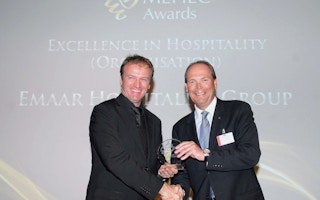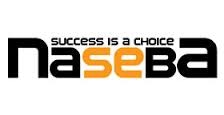Undaunted by what was apparently an inpenetrable market, Fabien Faure has led the entry and growth of naseba in the Kingdom of Saudi Arabia. The Frenchman from Lyon is managing director of product development for the firm, which convenes various stakeholders engaged in liquid growth markets in different parts of the world.
In a nation known for its fossil fuels, Faure expanded naseba’s energy summits primarily focused in solar power. Acceptance was difficult at the onset, he revealed, but now the company is on to its third Solar Arabia Summit this September. Their company even cites how Saudi Arabia has revised its National Energy Plan upwards from targeting 41 GW of renewable energy to 54 GW by 2032.
Faure who has a masters degree in business and economics, wants to push industries that are leading and ‘forward-thinking”. He candidly states that he ‘borrows’ ideas from competitor, then creates the opportunities. In this interview, Faure shares with Eco-Business what sparked the idea for the solar summits and why solar energy is growing in markets like the Middle East and Latin America.
First off, what do you do as managing director of product development, and what is your role in staging events such as the naseba solar summits?
My role is essentially to look at opportunities across different industries and regions, mostly emerging markets. The easy way to develop a product is to get ‘inspired’ from your competition and ‘borrow’ their ideas. However, I pride myself in researching the markets the old fashion way, by picking up the phone and speaking and surveying the industry’s main stakeholders. We have a saying within naseba: “If it is already in the news, it is too late.” If you want the best event, you must get it out in the open before anyone knows about it.
Finding and developing a great product is not rocket science, you let others tell you who they want to meet, hear from or do business with and you just put the platform together.
“
The key factor in the Middle East, Africa and Latin American regions is the massive untapped potential, and in most cases, considerable local resources. The only missing component is proven technology that is both sustainable and cost-efficient.
As for Solar Arabia, it was a very opportunistic decision for naseba. Scott [the company chaiman] and I were having a meeting with HE [Abdulrahman bin Ali] Al-Jeraisy, chairman of the Riyadh Chamber of Commerce, in his office when he casually mentioned that the Kingdom will become the biggest solar player in the world within the next five years. I didn’t think twice and got on the phone with solar energy movers and shakers and decided to go ahead with it.
So when did naseba begin producing the energy series of events and what is the potential for solar energy in the markets you have targeted?
Our energy series started four years ago simply because when we did industry research there was a growing need from developed countries to meet with emerging markets and discuss opportunities. Industries are constantly moving and you must always be on top of what is happening to ensure your events are at the forefront.
Take Saudi for example, even though the Kingdom has oil reserves for the next 30 years, they need to develop solar energy programmes for four main reasons:
- Abundance of Sun in the Kingdom
- Prepare for post oil reserve depletion. By being ready now, they will have no lack of energy in the future
- Produce enough solar energy to be able to supply local businesses and consumers with solar energy and export their oil barrels at full price rather than subsidised prices in the Kingdom
- The solar sector is also a big job creator and in KSA, it will be an opportunity to create jobs for the youth.
In Chile (where we have our Solar Latin America), the biggest demand comes from the mining industry and aluminium manufacturing, which needs to reduce their cost of electricity. The best way to do so is to attach a small solar plant to the mine.
What has been the industry reaction to your summits? What are the key growth areas moving forward?
Over the last two editions, we have received a very positive response and the biggest indicator for us has been the growing demand from international companies approaching us looking to enter the market. It started off as vision statement from Saudi Arabia, but today, there are active discussions on tendering projects, advanced talks in policies and creation of government programmes.
The key factor in the Middle East, Africa and Latin American regions is the massive untapped potential, and in most cases, considerable local resources. The only missing component is proven technology that is both sustainable and cost-efficient. This has been the highlight of our platforms, to bring those technology experts to meet directly with local stakeholders to discuss business opportunities.
Each year and going forward, we will expand the scope of our platform from focusing on specific technologies to incorporating new energies based on our on-going research and feedback from clients, partners and industry experts and trends.
What were some of the challenges when you began? How did you overcome them?
The biggest challenge for these events is to be accepted by all parties, from the government to the private sector, especially when you come in the early stages. Three years ago when we first hosted our Solar Arabia event, Solar in GCC [Gulf Cooperation Council] was at its infancy. When we launched our Solar Latin America last year, we took a gamble to host it in Chile rather than the obvious choice of Brazil. It paid off. If you want to succeed, you must find a consensus between the demands of both public and private sector.
Aside from that, my motto is to always question yourself and what you do, because you can always be or do better. Our solar events are a perfect example of that as every year we explore new regions and new avenues to generate the best events. Our solar events are the highest revenue generating events because we constantly reinvent their concept.
Saudi Arabia has increased its renewable energy targets, according to the naseba website. How much would you say was due to the influence of your events?
I would like to take the credit for it and proudly say that because of our event, the Kingdom of Saudi Arabia has reviewed its targets; however, I would probably be lying. What the event achieved, though, is to introduce international companies to local KSA businessmen who have an interest in forming joint ventures and partnerships together. I tend to believe that in the next couple of years, a lot of partnerships will form and I would like to think both parties would only have met at our KSA initiative. If you do the math, in two years time we would have introduced 3,000 companies to each other.
The ultimate goal of the energy series is to be recognised as the ultimate business platform for international companies to form partnerships with emerging markets.
For someone who didn’t start out in the field of solar energy and sustainability, what has been a major takeaway for you?
That the biggest fossil fuel producer in the world could one day be the biggest green energy exporter in the world. Like what naseba is, our name comes from the Japanese expression “naseba naru”, which means “when there is a will, there is a way.”


















